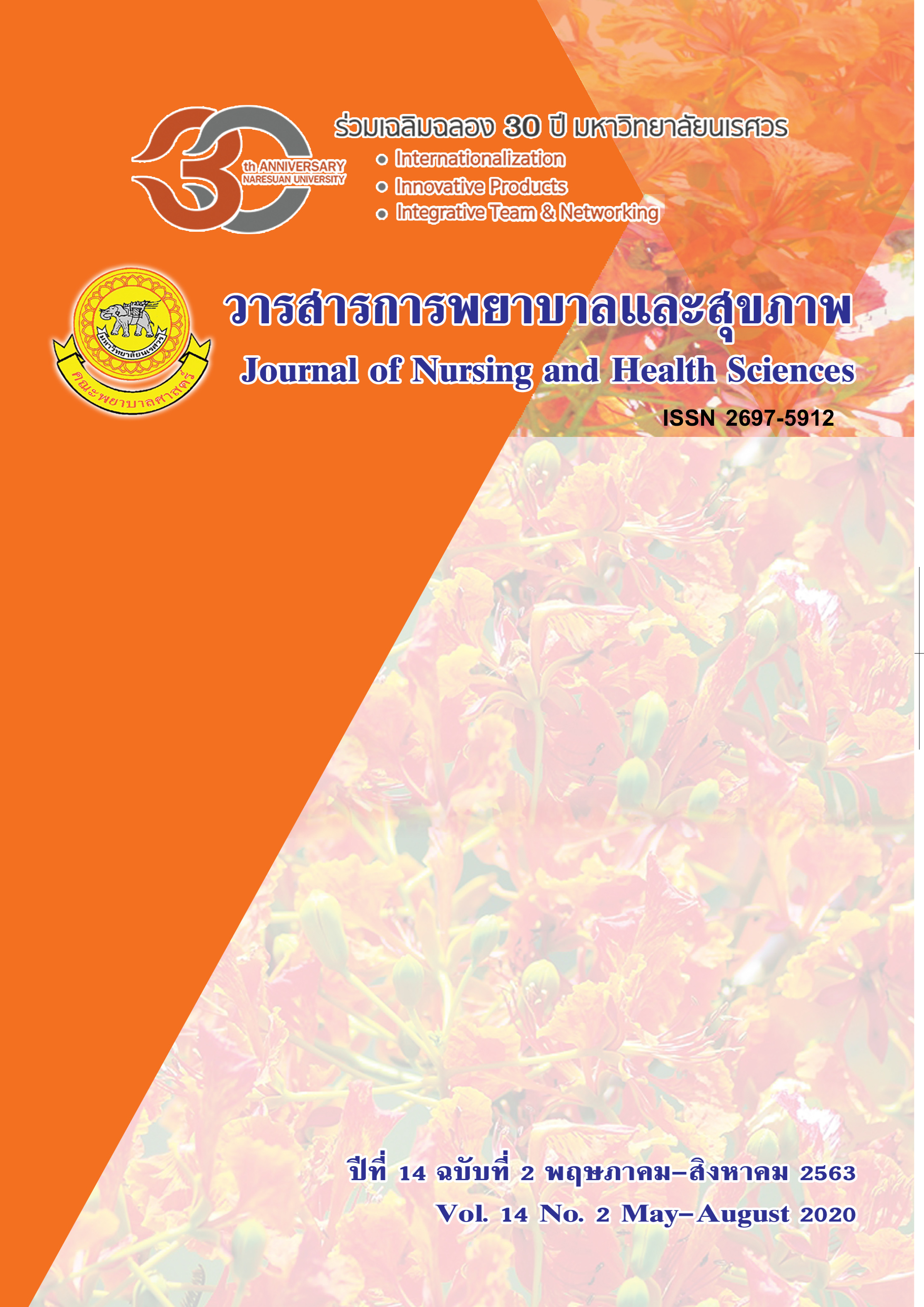Effects of a Relative Support Program in Dealing with Crisisof Accidental Traumatic Patients on Adaptation
Main Article Content
Abstract
This research was a quasi-experimental Two-group pretestposttest study. The objective was to study the effects of the relative support program in dealing with crisis of accidental traumatic patients on relative's adaptation. This study appliedthe concept of Aguilera and Messick's crisis theory was used. The samples consisted of relatives of accidental traumatic patients who were admitted at the accident and emergency department and the surgical intensive care unit of King NaraiMaharaj Hospital in Lopburi province. The samples consisted of 50 subjects, divided into anexperimental group and acontrol group,with 25 relative in each group. The instruments consisted of the relative support program in dealing with crisis of accidental traumatic patients, a guide for relatives' patient,and the adaptation questionnaire for the accidental traumatic patient's relatives. The instrument have reliability was 0.85. The data were analyzed usingdescriptive statistics and t-test statistics. The result revealed that after participatedin the programthe relatives had higher adaptive scorethan before implemented the program and also higher than the control group that obtained routine nursing care with statistical significance at the level of .001. This research findings show that this program can be supported the relatives to encounter crisis and have appropriate adaptation. Nurses should apply this program for promoting the accidental traumatic patient's relatives to deal with the crisis and adaptation.
Article Details
References
Aguilera, D. C., & Messick, J. M. (1982). Crisis intervention: theory and methodology (4th ed.). California: St Louis: C.V. Mosby Company.
Bleulin. J. L., Rook. J., & Stills. G.M. (1982). Family in crisis: the impact of trauma. Critical Care Quarterly, 5(12), 38-45.
Daley, L. (1984). The perceived immediate needs of families with relatives in intensive care setting. Heart & Lung, 13(3), 231-237.
Ferrar, J. A. (2002). Psychosocial impact of trauma.In K. A. Mcquillan, K. T.,VonReuden, R. L., Hartsock, M. B., Flynn, E., & Whalen, (Eds.), Trauma nursing for resuscitation through rehabilitation (3rd ed.). Philadelphia: Lippincott.
Jumnongnit, K. (2008). Crisis intervention for families of severs injury patients with traffic accident. Master Thesis (Nursing), Khonkaen University, Khonkaen. [In Thai].
Kotpratum, K. (2002). An adaptation of family with a severe head injury of a member under hills family crisis model. Master Thesis (Nursing), Khonkaen University, Khonkaen. [In Thai].
Lazarus, R., & Folkman, S. (1984). Stress, appraisal, and coping. New York: Springer.
Laudthong, J. (2007). Effect of preparatory information program on anxiety traumatic patients. Master Thesis (Nursing), Khonkaen University, Khonkaen. [In Thai].
Leske, J. S. (2002). Intervention to decrease family anxiety: Protocols for practice. Critical care nurse, 22(6), 61-65.
Lhaosupab, N. (2013). Effect of stress management program for relatives of critically ill patients on relatives’ stress. Master Thesis (Nursing), Mahidol University, Bangkok. [In Thai].
Prasittikan, N. (2010). The Effects of clinical nursing practice guidelines for readiness preparation of cargivers in dealing with patient crisis on cargivers’ needs response at the emergency department. Master Thesis (Nursing), Mahidol University, Bangkok. [In Thai].
Phuengbunhan, K., Pamosinlapathum, T., Mechan, L. (2014). Developing a model of caring for the critical multiple trauma patient in Uttaradit hospital. Uttaradit Journal, 6(1), 24-37. [In Thai].
Piyasiripan, N. (2010). Applying Swanson’s theory of caring on nursing care for the families of critical ill patients. Journal of Nursing and Health sciences, 4(3), 1-13. [In Thai].
Sathum, A. (2007). The effect of information providing based on family’s needs on family’s satisfaction in the family having the patient admitted in the intensive care unit. Master Thesis (Nursing), Khonkaen University, Khonkaen. [In Thai]
Wongkrai, B., & Jitpanya, Ch. (2007). The effect of family needs supporting program on adjustment of family members of patients with traumatic brain injury. Journal of Nursing Science Chulalongkorn University, 19(2), 86-97. [In Thai].
Yotinwattanabumrung, A. (2005). The effect of family crisis intervention program on adaptation of family members of patients admitted in an intensive care unit. Master Thesis (Nursing), Chulalongkorn University, Bangkok. [In Thai].


